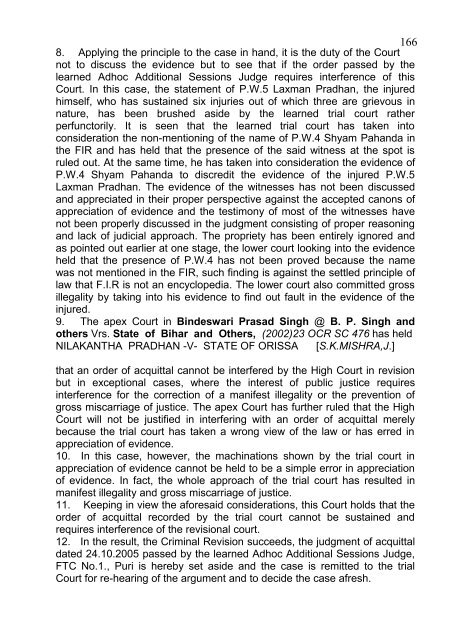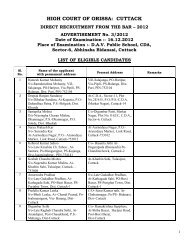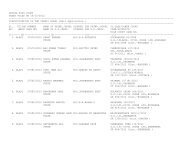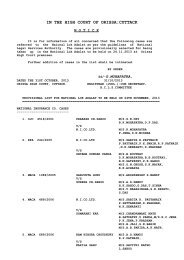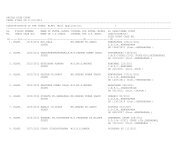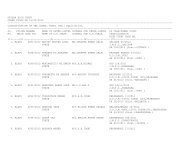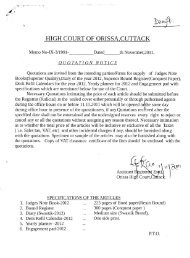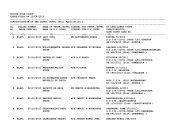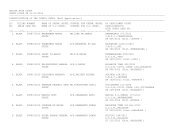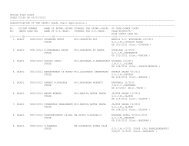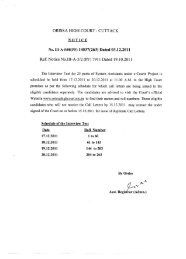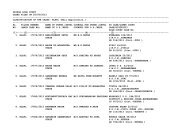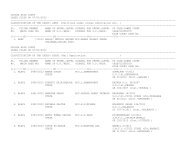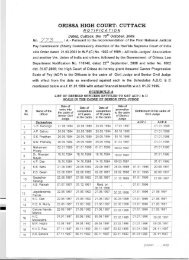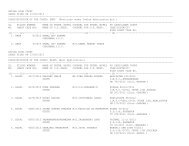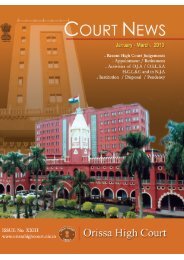ORIGINAL JURISDICTION - Orissa High Court
ORIGINAL JURISDICTION - Orissa High Court
ORIGINAL JURISDICTION - Orissa High Court
Create successful ePaper yourself
Turn your PDF publications into a flip-book with our unique Google optimized e-Paper software.
166<br />
8. Applying the principle to the case in hand, it is the duty of the <strong>Court</strong><br />
not to discuss the evidence but to see that if the order passed by the<br />
learned Adhoc Additional Sessions Judge requires interference of this<br />
<strong>Court</strong>. In this case, the statement of P.W.5 Laxman Pradhan, the injured<br />
himself, who has sustained six injuries out of which three are grievous in<br />
nature, has been brushed aside by the learned trial court rather<br />
perfunctorily. It is seen that the learned trial court has taken into<br />
consideration the non-mentioning of the name of P.W.4 Shyam Pahanda in<br />
the FIR and has held that the presence of the said witness at the spot is<br />
ruled out. At the same time, he has taken into consideration the evidence of<br />
P.W.4 Shyam Pahanda to discredit the evidence of the injured P.W.5<br />
Laxman Pradhan. The evidence of the witnesses has not been discussed<br />
and appreciated in their proper perspective against the accepted canons of<br />
appreciation of evidence and the testimony of most of the witnesses have<br />
not been properly discussed in the judgment consisting of proper reasoning<br />
and lack of judicial approach. The propriety has been entirely ignored and<br />
as pointed out earlier at one stage, the lower court looking into the evidence<br />
held that the presence of P.W.4 has not been proved because the name<br />
was not mentioned in the FIR, such finding is against the settled principle of<br />
law that F.I.R is not an encyclopedia. The lower court also committed gross<br />
illegality by taking into his evidence to find out fault in the evidence of the<br />
injured.<br />
9. The apex <strong>Court</strong> in Bindeswari Prasad Singh @ B. P. Singh and<br />
others Vrs. State of Bihar and Others, (2002)23 OCR SC 476 has held<br />
NILAKANTHA PRADHAN -V- STATE OF ORISSA [S.K.MISHRA,J.]<br />
that an order of acquittal cannot be interfered by the <strong>High</strong> <strong>Court</strong> in revision<br />
but in exceptional cases, where the interest of public justice requires<br />
interference for the correction of a manifest illegality or the prevention of<br />
gross miscarriage of justice. The apex <strong>Court</strong> has further ruled that the <strong>High</strong><br />
<strong>Court</strong> will not be justified in interfering with an order of acquittal merely<br />
because the trial court has taken a wrong view of the law or has erred in<br />
appreciation of evidence.<br />
10. In this case, however, the machinations shown by the trial court in<br />
appreciation of evidence cannot be held to be a simple error in appreciation<br />
of evidence. In fact, the whole approach of the trial court has resulted in<br />
manifest illegality and gross miscarriage of justice.<br />
11. Keeping in view the aforesaid considerations, this <strong>Court</strong> holds that the<br />
order of acquittal recorded by the trial court cannot be sustained and<br />
requires interference of the revisional court.<br />
12. In the result, the Criminal Revision succeeds, the judgment of acquittal<br />
dated 24.10.2005 passed by the learned Adhoc Additional Sessions Judge,<br />
FTC No.1., Puri is hereby set aside and the case is remitted to the trial<br />
<strong>Court</strong> for re-hearing of the argument and to decide the case afresh.


